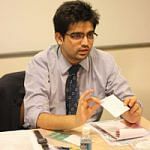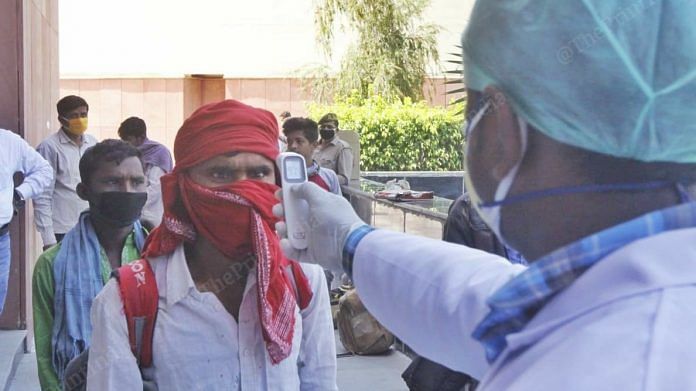 Between nationalism & globalism
Between nationalism & globalism
C. Raja Mohan | Director, Institute of South Asian Studies, National University of Singapore
The Indian Express
Mohan argues that in the times of a pandemic, “Sovereignty is certainly back. Solidarity is under stress, but not dead.” As the world order finds a middle ground between extreme globalism and hyper nationalism, Mohan points out that the first line of defence for all countries against coronavirus was shutting down of borders, when the “idea of a ‘borderless world’ had gained much acceptance in recent years”. However, Mohan adds that this drift away from globalisation was pre-corona, citing Brexit and Trump’s pushing away of open borders. He notes, “Even as world leaders put their own respective nations first, they will also explore new forms of solidarity.”
 Democracy should not permit a trade-off
Democracy should not permit a trade-off
Neera Chandhoke | Former professor of Political Science at Delhi University
The Hindu
Addressing the migrants exodus, Chandhoke says, “Measures taken during emergencies cannot come at the cost of institutional checks and balances.” On the state and central governments’ delay in remedial measures, she says, “The afterthought came too late and gave too little.” She raises a pertinent question on overreach of power by “authoritarian leaders” and asks, “When the disease has run its course, will these leaders abdicate the power they have amassed in the time of the coronavirus?”
 Masks, scarves and Covid-19: Let’s do our bit to contain the coronavirus. Let’s cover ourselves
Masks, scarves and Covid-19: Let’s do our bit to contain the coronavirus. Let’s cover ourselves
Supratik Guha | Professor, Pritzker School of Molecular Engineering, University of Chicago
The Times of India
Acknowledging that little information is available on the virus, its transmission and how useful a mask is, Guha says, “A mask or, in its absence, even a scarf around the nose and mouth offers significant protection.” He points out, however, that masks don’t provide 100 per cent protection and that social distancing is a must. Moreover, he adds, “Masks will need to be decontaminated every few days.” A question that we are yet to answer is — “Will a sicker person with clear symptoms of illness transmit more virus than an asymptomatic, but infected person?” He notes, “It is striking that organisations such as the World Health Organization have refrained from offering such simple recommendations.”
 The perils of political and religious extremism
The perils of political and religious extremism
Brahma Chellany | Geostrategist
Hindustan Times
Chellany argues, “China’s authoritarianism gave the world the pandemic. Religious zealots accelerated the spread of the disease.” Drawing parallels with the Shaheen Bagh protest in New Delhi and how little the government has learnt from it, he notes, “No country will allow protesters to blockade a highway even for one hour.” Noting how al Qaeda has often used the Tablighi Jamaat for recruitment, he notes, “Extremism is antithetical to the social and economic well-being of societies.” Quoting Algerian writer Mouloud Benzadi, he says, “Kill extremists and more extremists will appear. Kill extremist ideology and extremism will disappear.”
 Unemployment rate over 23%; labour participation rate at all-time low
Unemployment rate over 23%; labour participation rate at all-time low
Mahesh Vyas | Managing Director and CEO of CMIE
Business Standard
Vyas writes on the unemployment rate in India during the lockdown to curb spread of Covid-19. “In March 2020, the labour participation rate fell to an all-time low, the unemployment rate shot up sharply and the employment rate fell to its all-time low of 38.2 per cent”, explains Vyas. He notes, “The unemployment rate during this last week was 23.8 per cent. Labour participation rate fell to 39 per cent and the employment rate was a mere 30 per cent. Telephonic interviews caught pace in the week ended April 5… These yielded an unemployment rate of 23.4 per cent during this week; an LPR of 36 per cent and an employment rate of 27.7 per cent”. He calls these statistics “very worrisome”.
 Hail the power of networks!
Hail the power of networks!
Ajit Balakrishnan | The writer is an internet entrepreneur
Business Standard
Balakrishnan comments on contract tracing and network science during the coronavirus pandemic. “When a Covid-19 infected person is discovered in a community, energetic efforts are launched by citizens and law-enforcement authorities to locate the “super-spreader” and trace, list and test everyone that person has been in touch with”, explains Balakrishnan. He argues that Network Science — an academic field which studies complex networks —”is suddenly being practised by people as humble as a rickshaw puller to people as lofty as heads of state. It is no longer the domain of just scholars of esoteric sciences”.
 The covid crisis has put our social capital to a stress test
The covid crisis has put our social capital to a stress test
Ajit Ranade | Economist and a senior fellow at The Takshashila Institution
Mint
Ranade comments on the lockdown in India to fight Covid-19. “The sudden stoppage of daily wages and loss of jobs and incomes among largely informal-sector workers has already pointed to a serious economic emergency”, explains Ranade. He argues that “in trying to save lives from the virus, through the lockdown and social isolation, we should not find ourselves in danger of losing lives to starvation”.
 COVID-19 exposes deficiencies of BRICS
COVID-19 exposes deficiencies of BRICS
Aayush Mohanty | Research Associate at the Vivekananda International Foundation, a think tank based out of New Delhi
Economic Times
Mohanty comments on the role of BRICS organisation in managing the coronavirus pandemic. BRICS is a multilateral organisation comprising Brazil, Russia, India, China and South Africa. “As a grouping of emerging countries, none of them have had a dialogue with each other, even virtually as a group while COVID-19 was spreading at a rapid rate”, explains Mohanty. He argues that ” BRICS seems to have lost its way of achieving the intended political and economic goals, which was expected out of it from its advocates” and for “BRICS to stay relevant, it needs to make better use of its institutions, which it has set up over the last two decades”. He says “the lack of initiative along with internal discords on various issues might be responsible for putting the world population at risk while representing 43 per cent of them.”
Today’s Editorials
The Indian Express: The daily lists the various measures introduced by the chief ministers of different states to curb the coronavirus crisis and notes they are directly communicating with the public, offering class strategies and safety nets. Kerala CM Pinarayi Vijayan has been a standout performer, while Uddhav Thackeray too has been a reassuring presence, notes Express. States that invest in public services and administration are better equipped to handle a crisis, epidemic or natural disaster, it concludes.
The Times of India: The government’s plan to increase the number of tests was the need of the hour with cases doubling over the past four days, the daily notes. The ramping up of testing signifies the capacity that has been added with the country on a war footing during the ongoing lockdown. However, the wider testing strategy will be effective with contact tracing isolation and community surveillance methods, it writes.
The Hindu: Every health care worker is oriented on the principle of ‘first, do no harm’ during their training but the reports of attacks on health workers are chilling, writes Hindu. The daily notes that these attacks are a result of paranoia and are completely unmindful of the many risks health care workers take on during their work in a pandemic like this. Their safety is the responsibility of both the government as well as the people, it writes.
With inputs from Unnati Sharma



